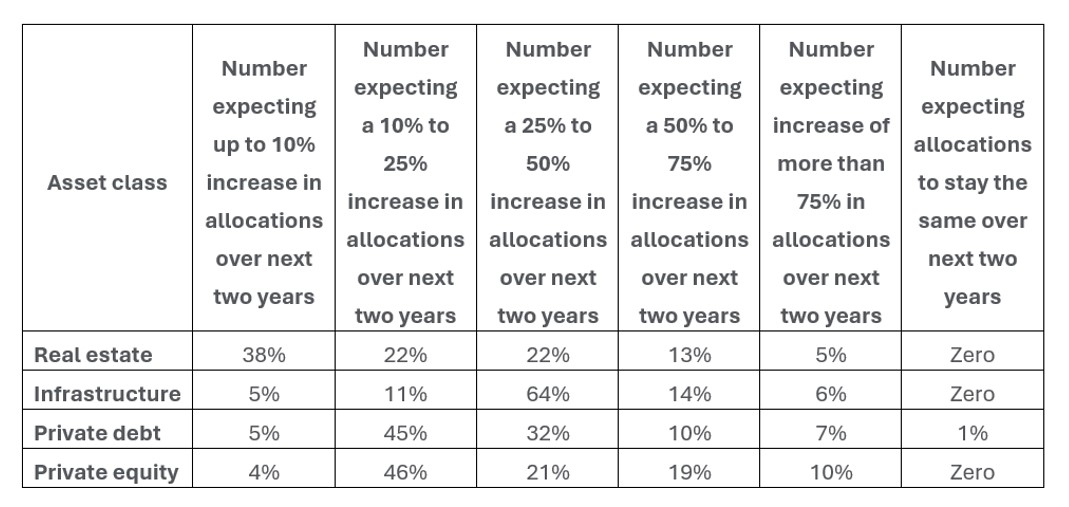Surveys
Family Office Sector Wants More Alternative Investment; Infrastructure Big Favourite – Study

There's been a steady drumbeat of talk about how wealth managers, including family offices, are keen to load up on alternative assets, such as private equity. And it turns out that for some, the standout asset of all is infrastructure.
A survey of 200 family office industry figures around the world collectively overseeing more $68.26 billion in AuM found that they intend to boost alternative asset class holdings.
Some 46 per cent expect to raise private equity allocations by 10 to 25 per cent in the next two years; 64 per cent expect to raise infrastructure exposure by 25 per cent to 50 per cent over that period, a survey from Ocorian, conducted in June from research firm PureProfile, found. Ocorian provides specialist services to financial institutions, asset managers, corporates, and HNW individuals.
Respondents are based in the UK, United Arab Emirates, Singapore, Switzerland, Hong Kong, South Africa, Saudi Arabia, Mauritius, Bahrain, Bermuda, Cayman, British Virgin Islands and Jersey.
“We’re seeing a clear acceleration in the shift towards alternative investments across both mature and emerging family office markets,” Simona Watkis – head of private client – Cayman, said.
A shrinkage of listed companies around the world since the 1990s, and the rise of private equity as an asset class, has driven some of the shift, along with more than a decade of ultra-low interest rates after 2008 which crushed yields on listed equities. Volatility before and after the pandemic has also played a role in fuelling interest in alternatives. As explained here in our North American publication, surveys by both UBS and BNY Wealth found that just over two-thirds of family offices plan to increase allocation to private equity investments and funds, while around 30 per cent indicated that they would be increasing exposure to private debt.
In Asia, to give a specific regional example, more than three-quarters (77 per cent) of wealth management professionals in Asia-Pacific saw strong client demand for private market investment opportunities, according to a report in 2022 from WealthBriefingAsia, Hywin Wealth and VP Bank.
Real estate
The Ocorian report said slightly more than a fifth of those
surveyed (22 per cent) plan similar increases in real estate
while a third (32 per cent) expect to boost allocations to
private debt by a similar range. Around 21 per cent expect to do
the same for private equity.
The diversification benefits of alternative assets were identified as the key reason for increasing allocations ahead of the increased transparency of the asset class. The ability of some alternative assets classes, such as infrastructure, to provide an income was rated as the third most important benefit of investing in alternatives, the report said.
Recent strong performance was ranked fourth in the attractions of investing in alternatives for family office fund managers, ahead of greater choice in the sector which was ranked fifth and the ability of some alternative asset classes to provide protection against inflation at sixth.
The table below shows planned increases in allocations to alternative asset classes by family office fund managers questioned as part of the study in 13 countries or territories including the UK, UAE, Singapore, Switzerland, Hong Kong, South Africa, Saudi Arabia, Mauritius and Bahrain.

Source: Ocorian
"Family offices, as they’ve matured over the past two decades, are behaving more like institutional investors than ever before – seeking data-driven, operationally-efficient ways to gain exposure to and track alternatives,” Vince Calcagno, head of US growth for Ocorian, said. “As the complexity of these investments increases, so too does the need for sophisticated solutions, especially outsourced CFO, that can offer the financial clarity and control families require. Whether it's infrastructure, private credit, or real estate, the key is supporting families with the right technology and knowledge to evaluate performance, manage risk, and plan strategically across generations."